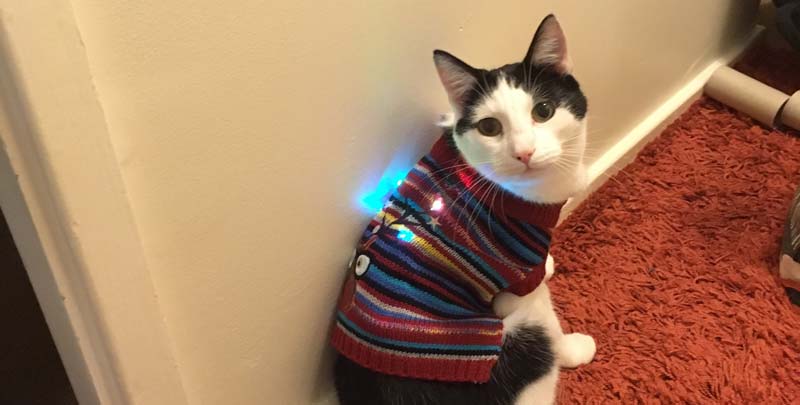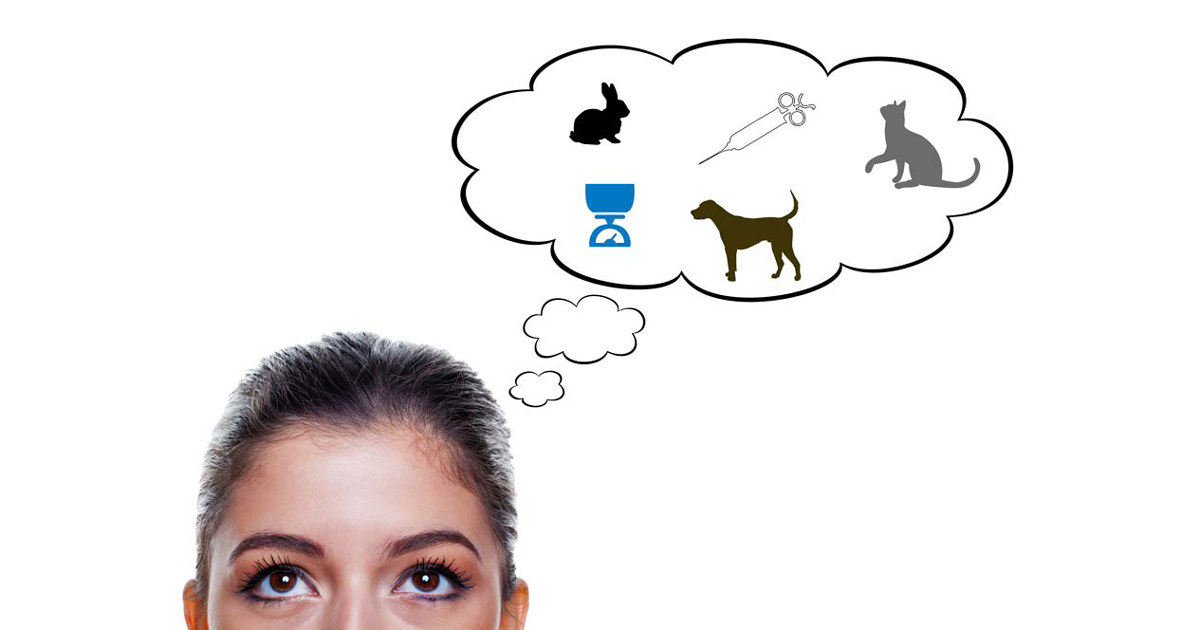As I scrubbed flea tablet-induced cat vomit from the floor for what felt like the hundredth time, I thought maybe I should just learn my lesson and do battle with spot-ons instead, no matter how much my cats scowl at me for days afterwards.
Or, worse still, I could try a collar, but I suspected after a certain Christmas jumper incident (photo evidence below), that would not go down well. It would seem I was having an internalised debate over the very basis of many discussions with clients during routine consults.
Short of adopting an actual rescue animal from work, this is about as close as it gets to bringing my work home with me. Or is it?
As a mixed vet in general practice, I don’t have case reports or publications to write up after hours. In theory, when I’m not on call, I can go home at night and not think about work until the next day. Except when I’m cleaning up my cat’s vomit.

Practice paranoia
But the reality is, when I am on call, I check the phone to make sure I haven’t missed a telephone call, I worry if I’ve taken a shower and forgotten to take the phone into the bathroom with me (am I really going to answer the phone in the shower anyway?!), and I wake up in the night and check the phone isn’t on silent.
I can never fully relax, even though I’m perfectly able to deal with pretty much anything that might be at the end of the telephone.
And when I’m not on call, it’s impossible to fully switch off. Something menial will remind me of that surgery I did last week… maybe I should check how the dog is doing? I’ll wake up in the night, suddenly remembering I forgot to telephone a client.
I will have obscure dreams somehow related to a procedure I’ve got the next day that I’ve done many times before, but it’s been a while, so can I still remember what to do?
Even if I have managed to let go of the above – more often on a weekend or when on holiday – I still can’t shake the innate vet instinct. I can’t help but notice the obese cat sat on the pavement, the skinny pony in the field or the lame dog walking down the street.
The vet mindset also wears off a little on those around us, too – my non-vet boyfriend can now spot an obvious luxating patella by eye, even if he does refer to it as the “small dog skipping thing”.
When scrolling through Facebook, I’m automatically drawn to the vet groups to read various opinions, hints and tips. WhatsApp groups with my uni friends will frequently ping with questions and advice, too. Perhaps social media plays a big part in being unable to let go of work, which is why it can be nice to completely shut it out every once in a while.

Animal instinct
Recently, I went camping to do just that. However, on walking though a field after climbing a hill, we came across two women who were clinging to each other, scared to move past the cattle that were happily minding their own business.
“Excuse me, watch that cow – she is really angry,” one of the women called as the cow in question started making its way towards us.
We waved our arms and stepped in her direction, to which she backed down and carried on grazing with her calf. We offered to walk the women across the field as they were evidently very nervous of the cows, confirmed by shrieking in response to another cow mooing to her calf a little way across the field.
“How did you do that? How did you get her to move away?” they asked.
They were in complete awe. My boyfriend told them I was a vet, and I explained we needed to try to not walk between any mothers and calves. Clearly not of rural backgrounds, they were very grateful to have made it to the fence safely.
While a veterinary degree is not necessary to know how to cross a field with cattle in, it did make me smile that I couldn’t completely escape being a vet that weekend. I think it is something that is deep-rooted inside us, and no matter how hard we try, I don’t think we can ever truly switch off the vet brain.
The real question is, would we want to anyway if we could?

Leave a Reply